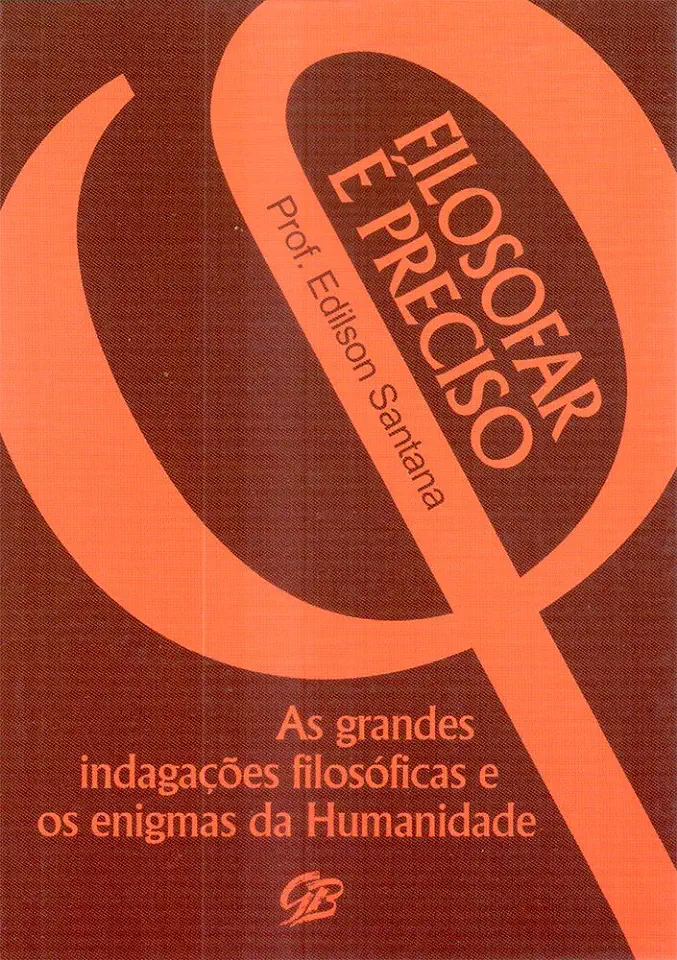
Philosophy is Necessary - Edilson Santana
Philosophy is Necessary: A Comprehensive Guide to the Art of Thinking
Introduction
In a world that is constantly evolving and presenting new challenges, it is more important than ever to have a strong foundation in philosophy. Philosophy is not just an academic pursuit; it is a practical tool that can help us make sense of the world around us and make better decisions.
In his book, "Philosophy is Necessary," Edilson Santana argues that philosophy is essential for a well-rounded education and a fulfilling life. He provides a comprehensive overview of the major areas of philosophy, including metaphysics, epistemology, ethics, and political philosophy. Santana also discusses the importance of critical thinking and problem-solving skills, and how philosophy can help us develop these skills.
Why Philosophy is Important
Philosophy is important for a number of reasons. First, it helps us to understand the world around us. By studying philosophy, we can learn about the different ways that people have tried to make sense of the universe and our place in it. This can help us to develop a more informed and nuanced understanding of the world, and to make better decisions about how to live our lives.
Second, philosophy helps us to think critically and solve problems. By studying philosophy, we can learn how to analyze arguments, identify fallacies, and develop creative solutions to problems. These skills are essential for success in any field, and they can also help us to make better decisions in our personal lives.
Third, philosophy helps us to develop our moral compass. By studying ethics, we can learn about the different theories of right and wrong, and we can develop our own moral principles. This can help us to make more ethical decisions, and to live more fulfilling lives.
Fourth, philosophy helps us to understand ourselves. By studying philosophy, we can learn about the nature of consciousness, the self, and the human condition. This can help us to develop a deeper understanding of ourselves, and to live more authentic lives.
The Major Areas of Philosophy
Philosophy is a vast and complex field, but there are a few major areas that are essential for a well-rounded education. These areas include:
- Metaphysics: Metaphysics is the study of the fundamental nature of reality. Metaphysicians ask questions such as: What is the nature of being? What is the relationship between mind and matter? Does God exist?
- Epistemology: Epistemology is the study of knowledge. Epistemologists ask questions such as: What is knowledge? How do we know things? What are the limits of human knowledge?
- Ethics: Ethics is the study of right and wrong. Ethicists ask questions such as: What is the good life? What are our moral obligations to others? How should we make ethical decisions?
- Political Philosophy: Political philosophy is the study of the nature of government and society. Political philosophers ask questions such as: What is the best form of government? What are the rights and responsibilities of citizens? How should we organize society to promote justice and equality?
The Importance of Critical Thinking and Problem-Solving Skills
Critical thinking and problem-solving skills are essential for success in any field. Philosophy can help us to develop these skills by teaching us how to analyze arguments, identify fallacies, and develop creative solutions to problems.
Critical thinking is the ability to think clearly and rationally about a topic. It involves being able to identify the main points of an argument, evaluate the evidence, and draw conclusions. Problem-solving is the ability to identify a problem, develop a plan to solve it, and implement the plan.
Philosophy can help us to develop critical thinking and problem-solving skills by teaching us how to:
- Identify arguments: The first step to analyzing an argument is to identify it. This means being able to distinguish between an argument and other types of writing, such as a story or a description.
- Evaluate evidence: Once you have identified an argument, you need to evaluate the evidence that is presented to support it. This means being able to determine whether the evidence is relevant, reliable, and sufficient.
- Draw conclusions: After you have evaluated the evidence, you need to draw conclusions about the argument. This means being able to state the main points of the argument and to assess whether the evidence supports the conclusion.
How Philosophy Can Help Us to Live More Fulfilling Lives
Philosophy can help us to live more fulfilling lives by teaching us about the nature of happiness, the meaning of life, and the importance of virtue.
Happiness is a central concern of philosophy. Philosophers have argued about the nature of happiness for centuries, and there are many different theories about what makes people happy. Some philosophers believe that happiness is found in pleasure, while others believe that it is found in virtue or in the pursuit of knowledge.
The meaning of life is another important question that philosophers have grappled with for centuries. There is no one answer to this question, but philosophy can help us to explore different possibilities and to find meaning in our own lives.
Virtue is a key concept in philosophy. Virtue is a character trait that is considered to be morally good. Philosophers have identified many different virtues, such as courage, justice, and wisdom. Virtue is important because it helps us to live good lives and to achieve happiness.
Conclusion
Philosophy is a powerful tool that can help us to make sense of the world around us, make better decisions, and live more fulfilling lives. If you are interested in learning more about philosophy, I encourage you to read "Philosophy is Necessary" by Edilson Santana. This book is a comprehensive and accessible introduction to the major areas of philosophy, and it will provide you with the tools you need to think critically about the world around you.